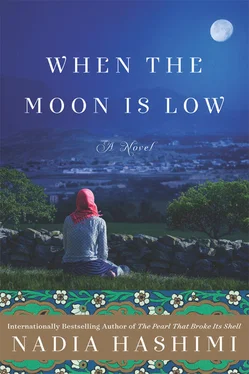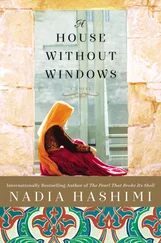He knew about my schooling. How did he know so much about me when I knew nothing about him?
“You seem to know my story well. And I know nothing about you, except that you like to spy on your neighbors and read poems in the trees.”
He chuckled.
“The height gives me perspective. But you’re probably right. What would you like to know about me?”
“What are you studying?” I plucked at blades of grass, trying to imagine his face.
“Engineering. I’m nearly done with my university studies. Maybe that’s why I like to sit where the birds sit. From a distance it’s easier to see how things work, how water flows from high to low.”
“You sound like you enjoy it very much.”
“I do, yes.”
“I would like to go to university too.”
“What would you like to study?”
Months ago, I’d been giving that very question a good deal of thought, though I hadn’t come up with an answer. It occurred to me that in the last few weeks, I’d stopped imagining my tomorrows. I’d stopped thinking about what I wanted to do. Boba- jan would have been disappointed. My angel from the orchard, if he’d really existed, would have shaken his head. What did I want to do?
An answer rolled off my tongue as if I had made up my mind years ago. And it was the most natural decision.
“Teaching. I think there is nothing more important than teaching. Of course, engineering is important too, but even engineers need teachers.”
“You are right. Teachers are the yeast that makes the dough rise. You would be a great teacher.”
“I don’t know if I’ll have the chance,” I said, my voice lowered.
“Has your family said anything about it yet?”
“No. I don’t think I’ll hear anything until it’s already been decided. I almost feel like I’m already not part of this family. My mother and my sisters, they’re so wrapped up in guests and gifts and celebrations. It’s all happening around me and I’m invisible, the girl who used to live in this house.” My voice cracked with my last sentence.
“You’re not invisible. I can close my eyes and picture you. I can be alone and hear your voice. You’re anything but invisible.”
In those words, the voice made a declaration that could not be misinterpreted. His was the only voice I wanted to hear, the only person who spoke to me about me. It was as if he’d scaled the clay wall between us and let my head rest on his shoulder.
“You shouldn’t say such things,” I said quietly. My reaction was reflexive, protective.
He understood.
“Let’s do something then, shall we? Maybe we should say a prayer? What do you think?”
I was no stranger to prayer. When the azaan beckoned from the nearest minaret, I felt a calm. Five times a day, I had a chance to share my thoughts with God. I had a chance to ask for forgiveness and pray that Allah keep my mother and grandfather in His peaceful gardens. Maybe God would hear two voices together better than mine alone.
“Okay,” I agreed. I let him start.
“Bismillah al Rahman al Raheem. .”
“Bismillah al Rahman al Raheem. .”
He recited a simple prayer and I echoed the words softly, my eyes closed. He closed with a simple plea.
“Please, Allah, bring a solution to my neighbor’s situation. Please help her avoid the path that others are choosing for her and this suitor. She’s not been able to take a peaceful breath in these weeks and surely things would only be worse with this suitor, as You know better than any. Please find a way to bring her to a home that will not take her for granted. Please find a way to give her a hand in making this choice for herself and help her family to make the decision that is in her best interests. Please free her to pursue her studies in teaching so that she can, in turn, help others. Please do not let anyone hold her back from her goals.”
He paused.
“And please help me to achieve my goals, both in school and in life. Please bring us both a brighter future.”
If I could have seen into the future and known just how our prayers would be answered, I wonder if I still would have prayed along. I wonder if he would still have uttered those words. It frightened me to think that we would have. It frightened me more to think of what might have happened had we not done so.
MY HEAD ON MY PILLOW THAT NIGHT, I THOUGHT OF RABIA Balkhi, Afghanistan’s legendary poetess from the tenth century. Rabia, a true princess, lived lavishly in a palace with servants at her feet. When her father died, her brother became her guardian. Rabia lived in extravagant solitude, filling her empty days with verses of her own creation.
But love can grow even in a place where there is hardly air to breathe, and Rabia fell in love with a handsome young man, Baktash. Their affair, a hidden exchange of love letters and poems, was discovered by Rabia’s brother, who ordered his sister to be taken to the bathhouse. Her wrists were slashed as she lay in the steamy waters.
Rabia, in her own blood, wrote her last poem on the walls of the bathhouse and declared her undying love for Baktash.
Love was not something we could talk about. We explored the phenomenon only in poems and song lyrics or imported Bollywood movies, where as the story became more tragic and the lovers more star-crossed, the love between them became more profound. This was what we were taught, though only incidentally. The dead mother, the unwanted suitor, the boy in the orchard — the requisite elements were coming together to make my life an epic love tale. My adolescent heart churned with the nervous anticipation of tomorrow.
With eyes tightly closed, I tried to recall Rabia’s final poem but could only remember the last two lines:
When you see things hideous, fancy them neat.
Eat poison, but taste sugar sweet.
KOKOGUL WAS AT THE FRONT DOOR WHEN I CAME OUT OF MY room. Her voice carried through the hallway, her volume rising. Within seconds, she’d reached a frantic pitch.
She ran past me. I reached over to steady the teacups she’d sent rattling on the glass nesting table.
“Stay here. Watch your sisters and pray that this news is not true! I am going out to make sense of this. I’ve never heard such a story. . if this is a lie, I’ll curse that busybody. Dear God, this cannot be!”
She threw her chador over her head and whipped the end over her shoulder. The door slammed behind her before I could ask where she was going or what the terrible news was. I went about my chores with an uneasy feeling in my gut. My sisters were busy with their school lessons and would know nothing more than I’d already overheard. I would have to wait for KokoGul to return.
When two hours passed, I grew more apprehensive. I went through the courtyard and opened our front gate. Our quiet street offered no clues. A few children chased a feeble mutt, pelting it with scraps of trash. An older man walked by with a cane. Nothing looked out of the ordinary.
Padar- jan came home earlier than usual and found me beating the dust from the pillows in the living room. I couldn’t sit still.
“Where is your mother? Don’t tell me she’s gone out to the market again.”
“No, Padar- jan, she went to call upon a friend, I think. She didn’t say much — just that she’d heard some terrible news that she hoped wasn’t true.”
“Terrible news?” He looked alarmed, both by KokoGul’s sudden departure and by the anxiety in my voice. “Did she say what the news was?”
I shook my head.
“She was in a hurry. She flew out the door without explaining.”
My father sighed heavily and asked if I’d prepared dinner. He decided we would not get worked up before we knew what we were talking about. My father would swallow a spoon of salt smiling if it meant keeping the house in peace.
Читать дальше












